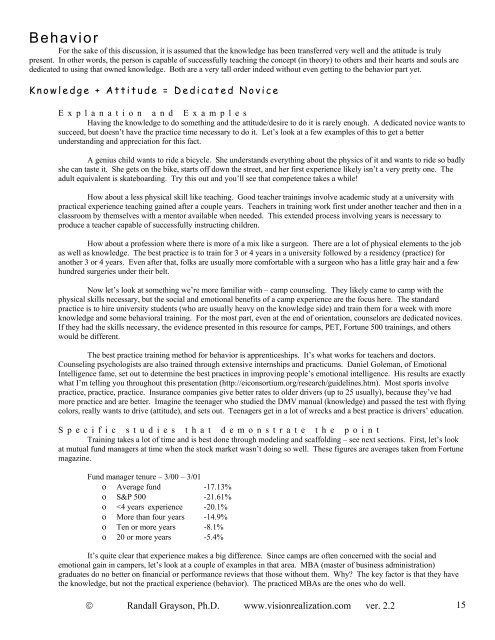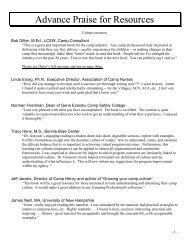Taking Camp Staff Training From Good To Best ... - Vision Realization
Taking Camp Staff Training From Good To Best ... - Vision Realization
Taking Camp Staff Training From Good To Best ... - Vision Realization
You also want an ePaper? Increase the reach of your titles
YUMPU automatically turns print PDFs into web optimized ePapers that Google loves.
Behavior<br />
For the sake of this discussion, it is assumed that the knowledge has been transferred very well and the attitude is truly<br />
present. In other words, the person is capable of successfully teaching the concept (in theory) to others and their hearts and souls are<br />
dedicated to using that owned knowledge. Both are a very tall order indeed without even getting to the behavior part yet.<br />
Knowledge + Attitude = Dedicated Novice<br />
Explanation and Examples<br />
Having the knowledge to do something and the attitude/desire to do it is rarely enough. A dedicated novice wants to<br />
succeed, but doesn’t have the practice time necessary to do it. Let’s look at a few examples of this to get a better<br />
understanding and appreciation for this fact.<br />
A genius child wants to ride a bicycle. She understands everything about the physics of it and wants to ride so badly<br />
she can taste it. She gets on the bike, starts off down the street, and her first experience likely isn’t a very pretty one. The<br />
adult equivalent is skateboarding. Try this out and you’ll see that competence takes a while!<br />
How about a less physical skill like teaching. <strong>Good</strong> teacher trainings involve academic study at a university with<br />
practical experience teaching gained after a couple years. Teachers in training work first under another teacher and then in a<br />
classroom by themselves with a mentor available when needed. This extended process involving years is necessary to<br />
produce a teacher capable of successfully instructing children.<br />
How about a profession where there is more of a mix like a surgeon. There are a lot of physical elements to the job<br />
as well as knowledge. The best practice is to train for 3 or 4 years in a university followed by a residency (practice) for<br />
another 3 or 4 years. Even after that, folks are usually more comfortable with a surgeon who has a little gray hair and a few<br />
hundred surgeries under their belt.<br />
Now let’s look at something we’re more familiar with – camp counseling. They likely came to camp with the<br />
physical skills necessary, but the social and emotional benefits of a camp experience are the focus here. The standard<br />
practice is to hire university students (who are usually heavy on the knowledge side) and train them for a week with more<br />
knowledge and some behavioral training. For the most part, even at the end of orientation, counselors are dedicated novices.<br />
If they had the skills necessary, the evidence presented in this resource for camps, PET, Fortune 500 trainings, and others<br />
would be different.<br />
The best practice training method for behavior is apprenticeships. It’s what works for teachers and doctors.<br />
Counseling psychologists are also trained through extensive internships and practicums. Daniel Goleman, of Emotional<br />
Intelligence fame, set out to determine the best practices in improving people’s emotional intelligence. His results are exactly<br />
what I’m telling you throughout this presentation (http://eiconsortium.org/research/guidelines.htm). Most sports involve<br />
practice, practice, practice. Insurance companies give better rates to older drivers (up to 25 usually), because they’ve had<br />
more practice and are better. Imagine the teenager who studied the DMV manual (knowledge) and passed the test with flying<br />
colors, really wants to drive (attitude), and sets out. Teenagers get in a lot of wrecks and a best practice is drivers’ education.<br />
Specific studies that demonstrate the point<br />
<strong>Training</strong> takes a lot of time and is best done through modeling and scaffolding – see next sections. First, let’s look<br />
at mutual fund managers at time when the stock market wasn’t doing so well. These figures are averages taken from Fortune<br />
magazine.<br />
Fund manager tenure – 3/00 – 3/01<br />
o Average fund -17.13%<br />
o S&P 500 -21.61%<br />
o





